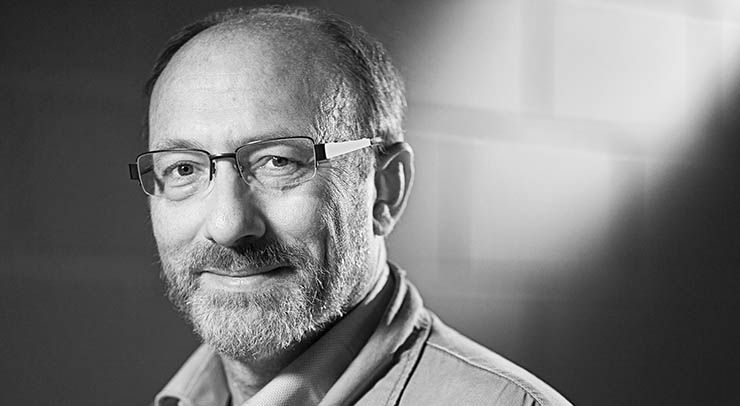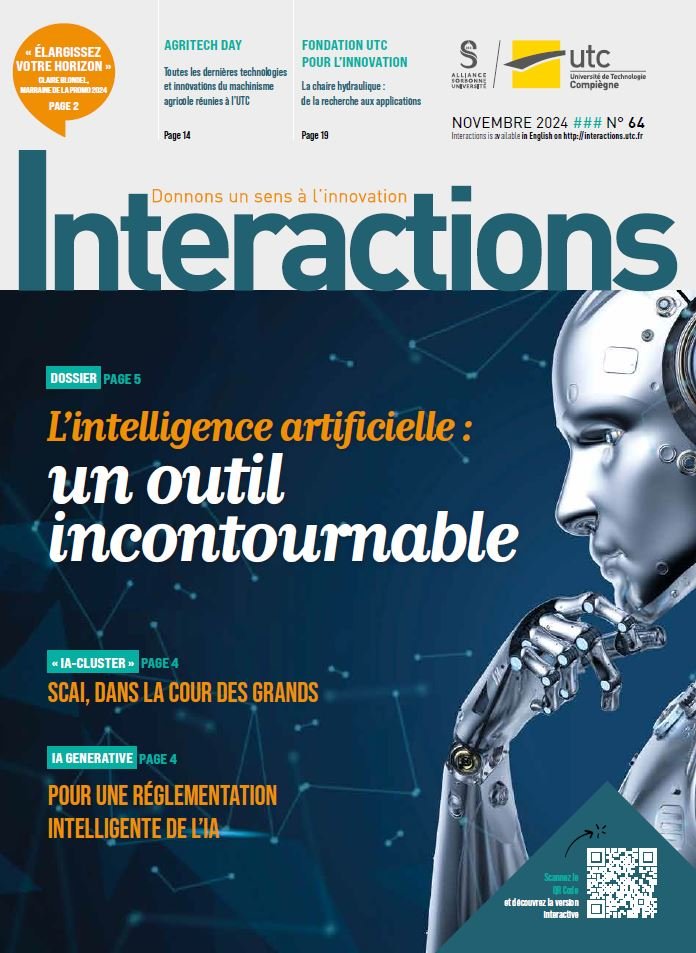Doing things to better understand them, understanding to take action

Charles Lenay is titular Professor of Philosophy and Cognition Sciences at UTC, posted to the UTC-Costech Lab (Knowledge and technology-intensive systems and organization). This year, June 5–12, he co-organized the ‘Journées de Cerisy¹’ conference on the theme “Social sciences and humanities in technological research”. In January 2017, Prof. Lenay received the insignia of Chevalier of the French Order des Palmes académiques.
It was when he was engaged — “with no specific problems” — in molecular biology studies (virology control mechanisms), that Charles Lenay read a book by an Ecole Polytechnique graduate, lecturer and philosopher, Prof. Jean-Pierre Dupuy entitled Ordres et désordres. Enquête sur un nouveau paradigme [Order and disorder ; investigating a new paradigm] Ed. Seuil, 1990 and which made him change heading and set out for new horizons. “My background training was mixed, so to say”, notes Charles Lenay, who prepared and presented in 1989 a thesis in history and scientific epistemology on the explanatory role played by chance in 19th Century biological theories²; Spurred with his PhD, Charles added two degrees, one in philosophy and the second in logic.
“What is the act of knowing? What does it mean to ignore and/or to know when and what you ignore?” these are among the questions that guided Charles to move towards then field of cognition sciences. Those that underpin our thinking processes.”” What always fascinated me (and continues to fascinate me*), are technology-related facts? Asking myself questions such as: what is technology doing with/to us? How does a technological environment forge us into human beings?” explains Charles Lenay.
When he was recruited by UTC in 1990, these questions and others were going to concretely serve this objective, leading on to the idea of “Developing social sciences and humanities, in their full gamut of possible themes — running from philosophy to the economy, from cognition sciences to ICTs …, including more sociological, anthropological, management, connotations … — within a technology-intensive environment” he stresses. Remember Johann Beckmann, was it not he who in his book entitled Entwurf der allgemeinen Technologie³ subtitled Projet de Technologie Générale, 1806, was the first to coin the dual concept of science and technology? Is this not similar to geology and biology belonging respectively to earth sciences and to biological sciences?
Hence the challenge accepted by UTC, even in its infant days, to set up a training curriculum with 30% of the engineering courses devoted to social sciences and humanities. This is a distinctive feature which, in the field of emerging cognition sciences became known as “the Compiegne school”. It is a specific feature which forces us to “seriously question the bases of technology. We must no longer try to understand it as an applied science, but rather see technology as an object in its own rights, suitable for basic scientific research. In short, understanding how technologies are transforming the way we live and act in today’s world”, adds Chares Lenay.
“As human beings, we are cultural creatures; means necessarily being technological. We refer here to a complete set of techniques, such as language skills, writing, plus other techniques that help us think, interact, perceive and interact in society … that make us human beings”, he insists. The first hominids possessed and used tools daily, didn’t they? “One of the remarkable ideas offered by Prof. André Leroi-Gourhan, a renowned ethnologist and historian, is that from the very earliest times, Mankind and techniques have always progressed together”. So, what are the consequences on today’s human beings of ongoing technology-related transformations, in particular those that accompany the digital revolution? “At this point in time, we simply do not know”, admits Prof Lenay.
Hence his unfailing commitment to work at the UTC-Costech Lab. “What we are trying to do in the Lab”, he insists, “ is to valorize an original approach to technical questions at a university of technology or also in the way we investigate and practice social and sciences and humanities in a technology-intensive environment, all of which led to the setting up of a science interest group (GIS) in 2011”. This GIS ‑aka UTSH (Unit for Social Sciences & Technology), is a conjunction of contributions from the 3 French universities of technology — UTC, UTBM-Belfort Montbeliard and UTT-Troyes, plus UniLaSalle (Beauvais). One of the objectives assigned to the UTSH is “to make this specific approach better known and to promote it, inasmuch as it is a really novel way to engage in social sciences. Hence the organization of the Journées de Cerisy Conference”, adds Charles Lenay. Participants are invited “not to look at technology from the outside, in a sort of cliff-overhang exercise, but to get involved in technological research. We must endeavour to get to the heart of technology and innovation”.
Serge Bouchardon, Director of UTC-Costech reportedly said “We do things to understand them and we understand things to act accordingly”. Prof Charles Lenay has adopted this motto. So, to conclude, what do we discover among his concrete achievements? Development of aids for purblind persons where the key idea is to implement systems that enable these persons to “touch and feel shapes on a screen”.
¹ cerisy-colloques.fr/recherchetechnologique2019/
² Lenay, C. ” Enquête sur le hasard dans les grandes théories biologiques de la deuxième moitié du XIXe siècle “. Doctorat de Philosophie et Histoire des sciences, Université de Paris I : Panthéon-Sorbonne, 1989.




